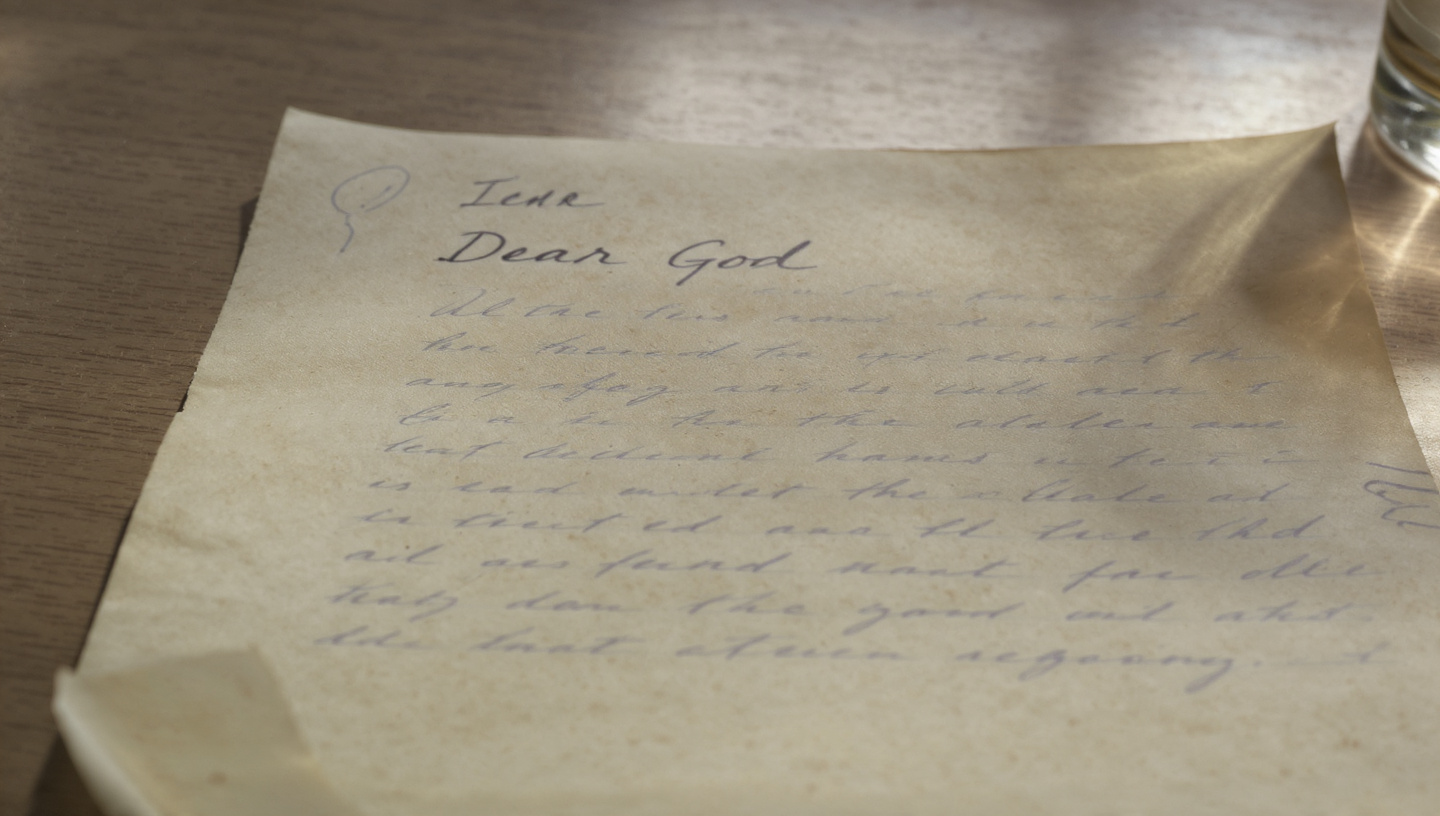Letters to God: When You Don’t Have the Answers
Oct 15, 2025
Letters to God: When You Don’t Have the Answers
It was late—one of those nights when silence feels loud. The kind of night when your thoughts won’t stop running laps around your mind. I sat staring at the ceiling, wrestling with a question I couldn’t answer: “God, why?”
Why this pain?
Why now?
Why me?
As a life coach and someone who guides others through moments of deep reflection, I’ve often reminded people that even the strongest faith can wrestle with questions. But that night, I wasn’t a coach—I was just a person trying to make sense of pain.
I had prayed before. I’d spoken words, cried tears, shouted in frustration, and whispered in surrender. But that night, it felt like the words got lost somewhere between my heart and heaven. I didn’t know what else to do.
So, I wrote.
I pulled out a notebook, opened to a blank page, and started writing a letter to God. Not a formal prayer. Not a journal entry. Just… a letter.
It began awkwardly: “Dear God, I don’t even know what to say.”
And then, something unexpected happened. The words started coming—raw, unfiltered, honest. Pain spilled out in ink. Questions I’d never dared to say out loud finally found their voice on paper.
And when I finished, I realized something: the problem hadn’t changed, but I had.
I had given my pain a place to go.
Why Writing a Letter to God Helps
Sometimes, you just need to feel like you’re doing something.
When you’re hurting, when the weight is too heavy, when you can’t find answers, sitting still feels impossible. You want to act—to fight, to fix, to move. Writing a letter to God gives you that “something.”
It’s your way of saying: “God, I told You. I let You know. I asked You for help. I cried out, and now You know my pain.”
There’s power in that. Because putting your pain into words isn’t just about expression—it’s about release.
This is a practice many people discover through life coaching or spiritual life coaching, where guided reflection and writing exercises help release emotions and bring clarity.
When you write it out, you’re not pretending anymore. You’re not performing. You’re not trying to sound spiritual. You’re just being real with the One who already knows every thought, every tear, every ache.
Perspective: Writing to God doesn’t change what He knows—it changes what you’re willing to share.

It’s Not for Him—It’s for You
God already knows your story. He already knows your pain. So why write it out?
Because you need to see it.
You need to name it.
You need to bring what’s hidden in the dark into the light.
The act of writing slows you down. It makes you think, feel, and process. It helps you sort through what’s real, what’s imagined, what’s fear, and what’s faith.
That’s something a mindset coach or personal development coach would tell you: slowing down helps you find the truth you already carry inside.
And somewhere in the writing—somewhere between the sentences and the sighs—healing starts.
You begin to remember that God’s not absent. He’s not indifferent. He’s just waiting for you to hand Him the pen.
Perspective: When you write to God, you stop carrying your pain and start sharing it.

The Power of Giving Voice to Pain
Pain has to go somewhere. If it doesn’t go out, it stays in—and what stays in eventually poisons the soul.
Unspoken pain turns into bitterness.
Unspoken fear turns into anxiety.
Unspoken grief turns into isolation.
Writing a letter to God gives your pain a voice. It gives it a path to leave your heart and land safely in His hands.
This is something many spiritual life coaches teach: transformation begins when you give your emotions permission to be expressed before God.
David did this all throughout the Psalms. His “letters” were songs, poems, and cries of anguish. “How long, O Lord?” (Psalm 13). “Why have You forsaken me?” (Psalm 22). “Out of the depths I cry to You.” (Psalm 130).
David didn’t hold back. He raged, questioned, pleaded, and praised—all in one breath. And God didn’t rebuke him for it. He recorded it. Preserved it. Used it.
That’s what happens when we pour our hearts out honestly—God takes our pain and turns it into something sacred.
Perspective: What you give voice to, God can begin to heal. What you hide, He can’t.

You Don’t Need Fancy Words
Some people hesitate to write because they think it needs to sound holy or polished. But God isn’t impressed by vocabulary—He’s moved by honesty.
Your letter can start with:
“Dear God, I’m angry.”
“Dear God, I’m lost.”
“Dear God, I miss them.”
“Dear God, I don’t understand.”
Or even:
“Dear God, are You still there?”
He can handle your honesty. In fact, He welcomes it.
You don’t need to know how to say it—you just need to start. Sometimes the most powerful prayer you’ll ever write is just three words: “God, help me.”
That’s something even an online life coach or confidence coach might affirm—simple, authentic expression always leads to breakthrough.

Writing It Out Brings Clarity
Have you ever noticed how thoughts swirl when you’re overwhelmed? Writing slows the chaos down. It puts the whirlwind into sentences that make sense.
In that process, God often reveals truth you didn’t even realize you believed—or needed to.
You start to see patterns.
You recognize lies you’ve been telling yourself.
You remember things God has already done.
Sometimes you even see the answer you’ve been looking for show up between the lines.
Perspective: When your mind feels loud, your pen can become your peace.
This reflective process is why many people seek purpose and clarity coaching—to discover direction and peace when life feels confusing.

When You Don’t Know the Why
Maybe the hardest part of faith is not understanding why. Why the diagnosis? Why the betrayal? Why the loss?
But faith isn’t built on knowing the “why.” It’s built on trusting the “Who.”
When you write a letter to God, you’re saying, “Lord, I don’t get this—but I trust You enough to talk to You about it.”
You’re not trying to fix it. You’re not trying to figure it out. You’re just inviting Him into the confusion. And that invitation is everything.
Perspective: Faith isn’t the absence of questions—it’s bringing your questions to God.

Writing as Worship
Sometimes your letter won’t be about pain at all. It’ll be about joy, gratitude, and love. You’ll write, “Thank You for getting me through that,” or “You were there when no one else was.”
Those letters are worship. They’re offerings of the heart.
The more you write, the more you’ll notice patterns of grace. You’ll see how He’s been working all along, even in the seasons that felt silent.
Perspective: Writing to God turns moments into memorials of His faithfulness.
It’s a practice I often recommend as a spiritual life coach—because gratitude reshapes your mindset, strengthens faith, and restores hope.

Your Letter Doesn’t Need an Ending
When you’re done writing, don’t worry about closing it with “Amen.” Sometimes the most honest letters are the ones left open-ended.
Because truthfully, your letter isn’t a conclusion—it’s a continuation. It’s a relationship. It’s a conversation that will keep unfolding, line by line, as your life continues to unfold.
You might come back to the same page months later and realize—He answered. Not always the way you wanted, but always in the way you needed.
Perspective: Prayer isn’t a one-way message—it’s a living conversation.

The Healing Comes in the Letting Go
When you write your letter, you’re doing something profound—you’re choosing to let go.
You’re saying:
“I don’t want to carry this anymore.”
“I don’t have to have all the answers.”
“I trust You, even when I don’t understand You.”
And that surrender—that act of release—is where peace begins.
It’s not about grammar or paper or eloquence. It’s about putting your heart on the altar and saying, “This is all I’ve got, Lord—but it’s Yours.”
Perspective: When you give God your words, you give Him permission to work in your heart.
That’s what Freedom Coach sessions are all about—helping people release control, surrender burdens, and rediscover peace through faith-based life coaching.

Wanting What God Wants…
God doesn’t just want your praise—He wants your pain.
He doesn’t just want your victories—He wants your vulnerability.
Because what He wants, always, is a strong, close, deep, loving, personal, passionate, intimate relationship with you.
And sometimes that begins with a pen, a page, and a heart that finally says, “God, here I am.”
So don’t keep it inside. Don’t let pain harden what God wants to heal.
Write it out. Cry it out. Give it to Him.
Because your words matter to God.
Your story matters to God.
You matter to God.

If you’re carrying something heavy—something you can’t explain or understand—don’t carry it alone.
Visit WalkerJames.Life and write your own Letter to God.
It’s simple. Private. Honest. Real.
Or explore a Guided Prayer when you don’t know where to start.
Or submit a Prayer Request and let others join you in faith.
Because sometimes, healing begins with the words you finally write down.
And today, that may look like a letter to God.
